Nestled in the heart of Kyoto, Jojuuji Temple whispers the secrets of tranquility through its ancient walls. Under the guidance of abbot Mr. Shizan Fujioka, visitors engage in zazen sessions that invite deep introspection, while the delicate art of Sencha-do tea ceremony unfolds like a meditation in motion. The air is filled with the subtle aroma of seasonal sweets, creating a harmonious blend of taste and mindfulness. Yet, what lies beyond the temple’s serene facade? The deeper connections to culture and history beckon, promising revelations that linger long after the final sip of tea.
Good To Know
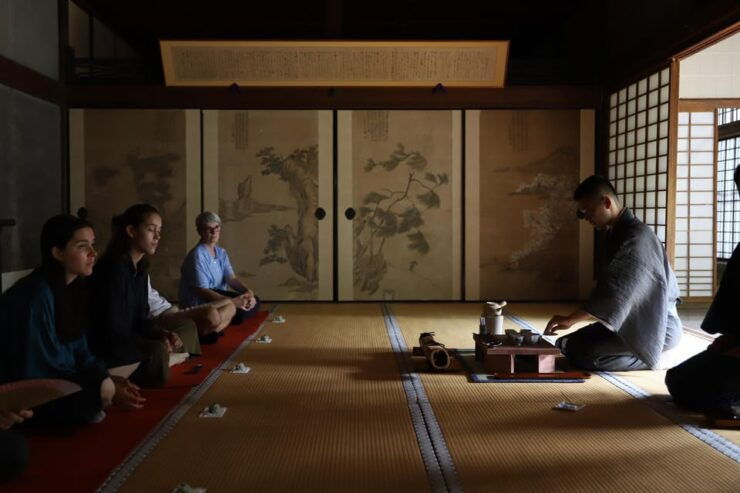
- Experience Zen meditation and an authentic tea ceremony at the serene Jojuuji Temple, founded in 810, rich in history and spirituality.
- Participate in two guided 20-minute zazen sessions led by esteemed abbot Mr. Shizan Fujioka for deep introspection.
- Enjoy a traditional Sencha-do tea ceremony featuring fragrant sencha and seasonal Japanese sweets, enhancing your sensory experience.
- Engage in a Q&A session with monks to deepen your understanding of Zen principles in an intimate group setting.
- Explore nearby attractions like Nanzenji Temple and Philosopher’s Path to enrich your visit to Kyoto’s cultural heritage.
Experience Overview
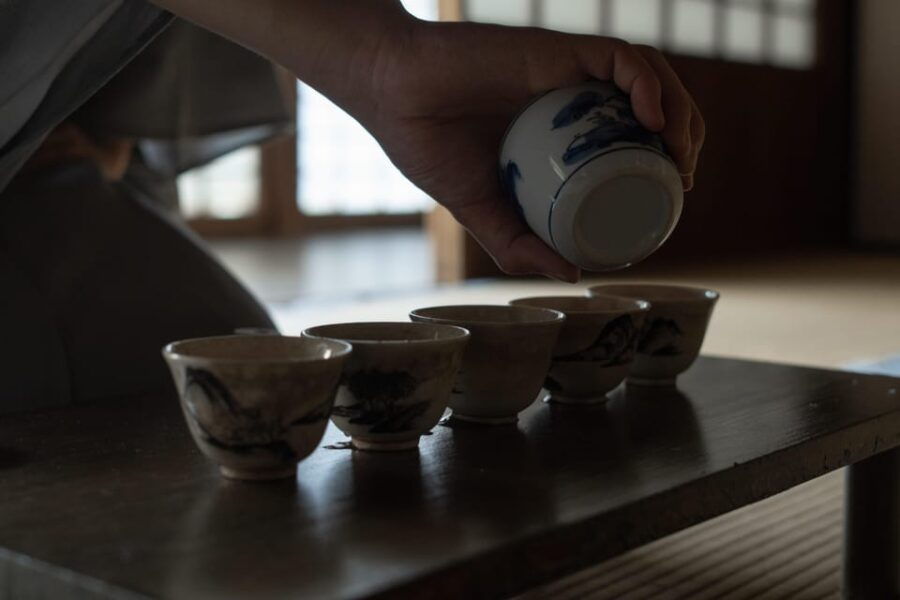
At Jojuuji Temple in Kyoto, visitors embark on a serene journey through Zen meditation and the traditional tea ceremony, seeing a practice that harmonizes mind and spirit.
Over 2.5 hours, participants engage in two 20-minute zazen sessions, guided by the wise abbot, Mr. Shizan Fujioka. This tranquil experience allows individuals to quiet their minds and connect deeply with their inner selves.
Following meditation, guests partake in the Sencha-do tea ceremony, where a skilled tea master brews exquisite tea paired with seasonal Japanese sweets.
With a limited group size of 10, the intimate setting fosters connection and reflection. Photographers capture these moments, ensuring a lasting memory of this transformative experience, which is also easily cancellable up to 24 hours in advance.
Find more activities and experiences we've covered in Kyoto.
Location and Historical Significance
Nestled in the heart of Kyoto, Jojuuji Temple boasts a rich history that dates back to its founding in 810.
Originally a samurai residence, this serene sanctuary now serves as a temple of the ōbaku sect of Zen Buddhism. The temple’s sacred staircase and meticulously maintained garden, with roots stretching over 400 years, invite visitors into a tranquil world steeped in tradition.
Designated as a Tangible Cultural Property, Jojuuji Temple preserves an atmosphere that echoes centuries of spiritual practice and cultural significance.
Each stone and pathway whispers tales of past monks and samurai, creating a unique blend of history and spirituality. Here, one can truly appreciate the depth of Zen culture that flourishes in this hidden gem of Kyoto.
Guided Activities
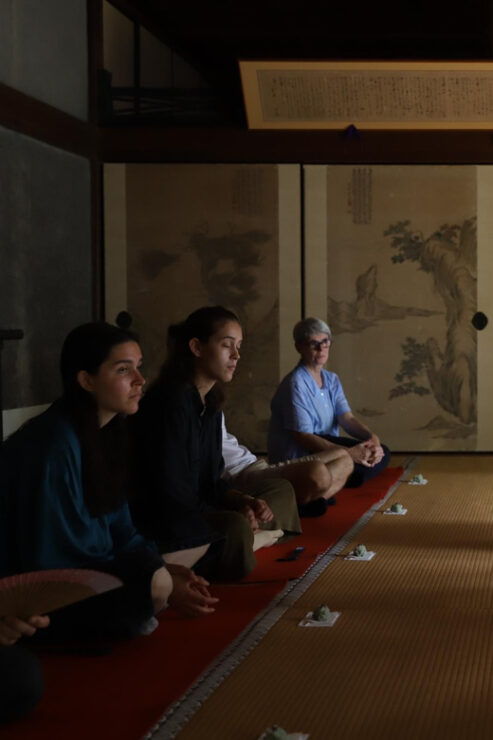
Engaging in the guided activities at Jojuuji Temple offers a unique immersion into the world of Zen meditation and tea culture.
Participants start with two 20-minute zazen sessions led by the esteemed abbot, Mr. Shizan Fujioka, where they embrace stillness and introspection.
After this serene experience, they engage in a Q&A session with the monks at Hojo, deepening their understanding of Zen principles.
The highlight comes with the Sencha-do Tea Ceremony, where a skilled tea master prepares fragrant sencha paired with seasonal Japanese sweets, creating a feast for the senses.
To capture these precious moments, a photographer discreetly documents the experience, providing participants with lasting keepsakes that encapsulate their journey into tranquility and tradition.
Zen and Tea Culture
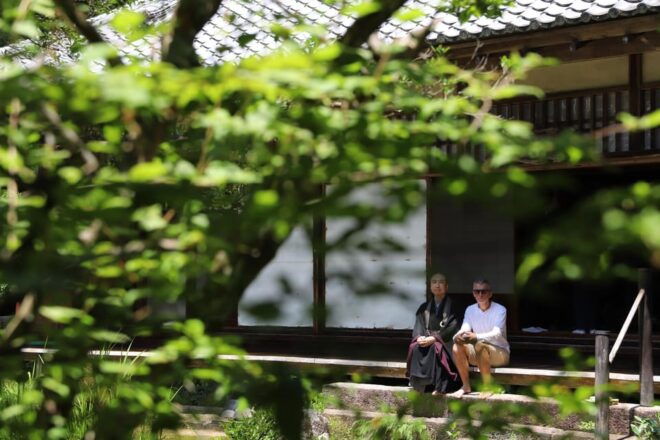
Zen and tea culture intertwine beautifully, reflecting a harmonious philosophy that centers on mindfulness and simplicity.
This connection cultivates a serene atmosphere, inviting participants to engage deeply with their surroundings. Through the practice of Zen and the art of tea, individuals experience:
Mindful Moments: Each sip of tea becomes an opportunity for reflection, grounding the mind in the present.
Cultural Richness: The infusion of Ōbaku Zen traditions, steeped in history, adds layers of meaning to every ceremony.
Emotional Tranquility: The tranquil environment encourages a sense of peace, allowing for a deeper connection to oneself and nature.
Together, Zen meditation and tea ceremonies create an enriching experience, fostering tranquility and mindfulness in the heart of Kyoto.
More Great Thing To Do NearbyParticipant Information
Participants can immerse themselves fully in the experience, regardless of their background or physical abilities. This unique opportunity welcomes individuals of all ages, fostering a sense of community and shared exploration.
While wheelchair users may require assistance due to the sacred staircase, comfortable seating options are available for those who prefer not to assume traditional postures. Attendees should dress in season-appropriate clothing to ensure comfort throughout the 2.5-hour session.
However, it’s essential to note that weapons or sharp objects are strictly prohibited. The program runs rain or shine, allowing participants to connect deeply with the serene environment of Jojuuji Temple, enriching their understanding of Zen and tea culture amidst this historical setting.
- Full Coverage Kyoto Private City Tour
- Kyoto Casual Evening Pontocho Food Tour
- Kyoto Fushimi Hidden Route Hiking & Soba Lunch
- Kyoto Night Walk Tour (Gion District)
- Gion and Fushimi Inari Shrine Kyoto Highlights With Government-Licensed Guide
- Arashiyama Bamboo Grove Day Trip From Kyoto With a Local: Private & Personalized
What to Expect
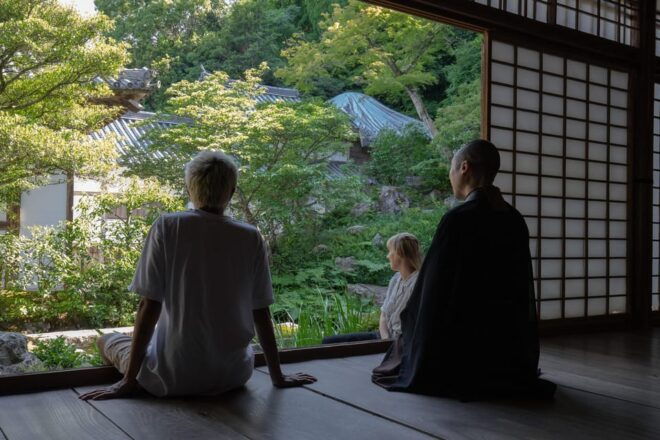
Attendees can look forward to a transformative experience that blends tranquility and tradition at Jojuuji Temple.
This serene setting offers a unique opportunity to engage in practices that soothe the soul and awaken the senses.
Participants will enjoy:
- Guided Zen Meditation: Two immersive zazen sessions led by the temple’s abbot, allowing minds to quiet and spirits to unify.
- Authentic Tea Ceremony: Relish the delicate flavors of sencha, brewed by a master, complemented by seasonal Japanese sweets that tantalize the taste buds.
- Cultural Insight: Engage in a Q&A with monks, deepening the understanding of Zen and its rich history.
Every moment spent at Jojuuji Temple promises to be enriching, leaving attendees with unforgettable memories.
Tips for Your Visit
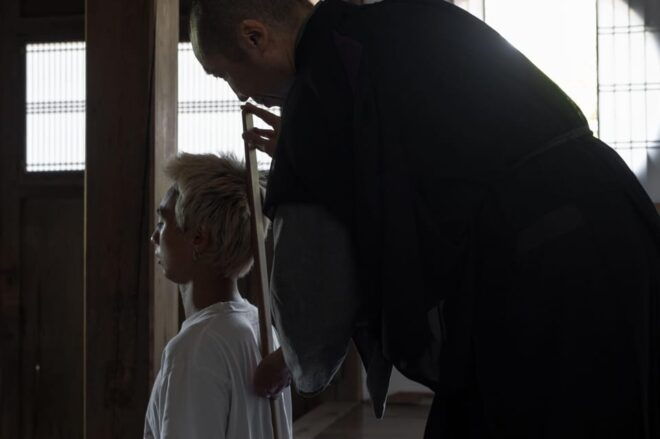
When planning a visit to Jojuuji Temple, it’s helpful to keep a few key tips in mind to enhance the experience.
Arrive early to soak in the serene atmosphere and admire the temple’s historical architecture. Dress comfortably and season-appropriately, as you’ll be engaging in meditation and the tea ceremony.
Participants should be prepared for traditional postures during zazen but know that comfortable seating is available if needed. Remember to turn off your phone to maintain the temple’s tranquil ambiance.
Nearby Attractions
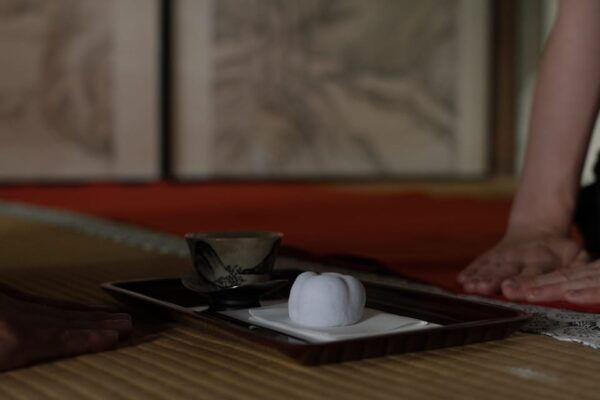
Exploring the area surrounding Jojuuji Temple unveils a treasure trove of cultural and historical gems that enhance any visit.
Travelers can enjoy the rich tapestry of Kyoto’s heritage by visiting:
Nanzenji Temple – A stunning Zen temple complex with breathtaking gardens and ancient architecture that whispers tales of tranquility.
Philosopher’s Path – A serene walkway lined with cherry blossoms, perfect for contemplation and reflection as you stroll beside a shimmering canal.
Heian Shrine – Known for its vibrant gardens and exquisite architecture, this shrine offers a glimpse into Japan’s imperial past.
These nearby attractions complement the peaceful experience at Jojuuji Temple, inviting visitors to delve deeper into Kyoto’s enchanting atmosphere and spiritual essence.
Frequently Asked Questions
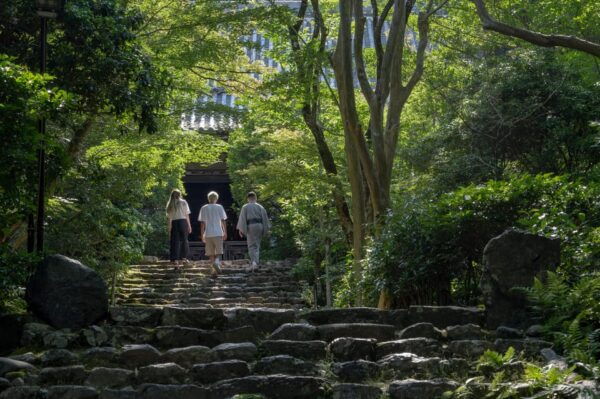
What Is the Best Time of Year to Visit Jojuuji Temple?
The best time to visit Jojuuji Temple is during spring, when cherry blossoms bloom, or autumn, showcasing vibrant foliage. These seasons enhance the temple’s serene atmosphere, allowing visitors to fully appreciate its historical beauty and tranquility.
Are There Any Age Restrictions for Participating in the Activities?
There’s no age restriction for participating in the activities. Everyone, regardless of age, can engage in the Zen meditation and tea ceremony, enjoying a serene atmosphere that welcomes all to experience this timeless tradition together.
Is Photography Allowed During the Meditation and Tea Ceremony?
Photography’s allowed during the tea ceremony, capturing the serene moments and vibrant tea presentations. However, participants must respect the meditation’s tranquility, refraining from taking photos during zazen sessions to maintain the sacred atmosphere.
Can Dietary Restrictions Be Accommodated During the Tea Ceremony?
Dietary restrictions can be accommodated during the tea ceremony. Participants should inform the organizers in advance, ensuring a delightful experience tailored to individual needs, allowing everyone to savor the flavors without concern.
How Can I Get to Jojuuji Temple From Central Kyoto?
To reach Jojuuji Temple from central Kyoto, travelers can take a bus or subway, enjoying scenic views. They’ll appreciate the journey, which immerses them in Kyoto’s rich culture before arriving at the serene temple.
The Sum Up
At Jojuuji Temple, visitors find a rare opportunity to disconnect from the chaos of modern life and reconnect with themselves. The serene atmosphere, coupled with the wisdom of abbot Mr. Shizan Fujioka, creates a transformative experience through Zen meditation and the art of tea. As the gentle sounds of nature surround them, participants leave not just with a deeper understanding of Japanese culture, but with a lasting sense of inner peace and mindfulness that enriches their journey in Kyoto.
You can check if your dates are available here:More Tour Reviews in Kyoto
Looking for something different? Other Kyoto activities we've written about
- Hidden Kyoto- Countryside & Local Life – Private Car Tour
- Kyoto Gion: Japanese Traditional Experience -Kimono, Yukata
- Kyoto Osaka Kyoto and Nara Customized Private Guided Tour
- Kyoto Popular Tour : Learn Japanese Philosophy From Kyoto
- Scenic Riverside Ride in East Kyoto
- Kyoto Culinary Tour With a Chef!
- Kyoto: Top Sake Region Tour – 2.5 Hours, 3 Tasting Spots
- Hidden Temples in Kyoto a Self-Guided Zen Tour
- 2 Hour Private Tour of Arashiyama Highlights
- Kyoto: Nijo Castle, Noble Architecture and Gardens Guided Tour
- Kyoto: Discover Every Bit of Ginkakuji Temple in 60 Minutes
- Kyoto Afternoon and Night Tour With Japanese Traditional Dinner
